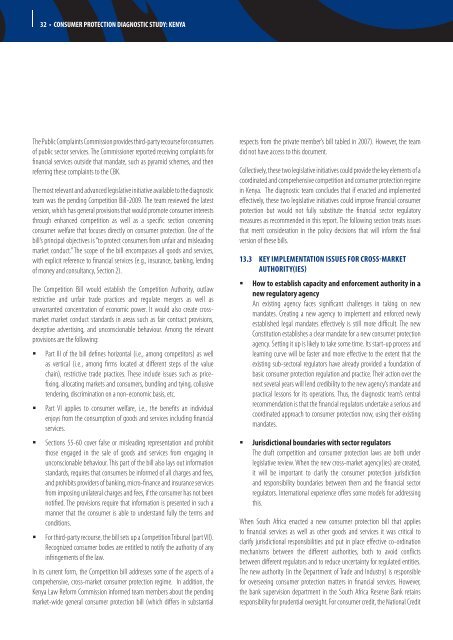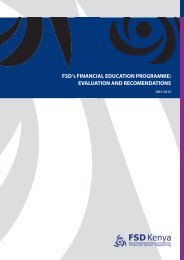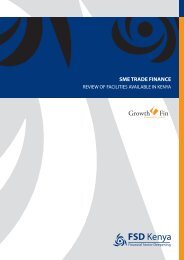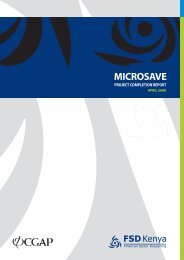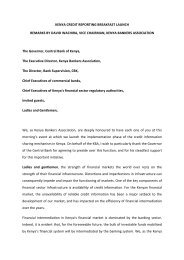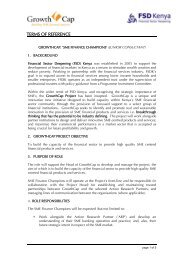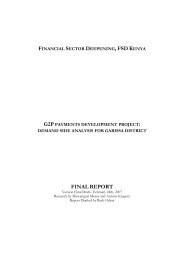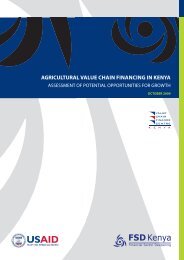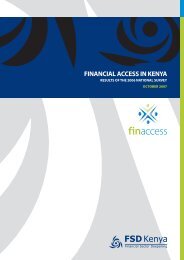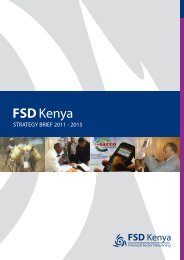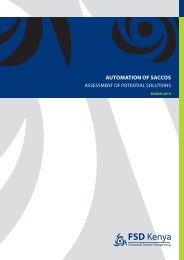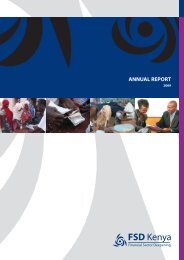Consumer protection diagnostic study - FSD Kenya
Consumer protection diagnostic study - FSD Kenya
Consumer protection diagnostic study - FSD Kenya
Create successful ePaper yourself
Turn your PDF publications into a flip-book with our unique Google optimized e-Paper software.
32 • CONSUMER PROTECTION DIAGNOSTIC STUDY: KENYA<br />
The Public Complaints Commission provides third-party recourse for consumers<br />
of public sector services. The Commissioner reported receiving complaints for<br />
financial services outside that mandate, such as pyramid schemes, and then<br />
referring these complaints to the CBK.<br />
The most relevant and advanced legislative initiative available to the <strong>diagnostic</strong><br />
team was the pending Competition Bill-2009. The team reviewed the latest<br />
version, which has general provisions that would promote consumer interests<br />
through enhanced competition as well as a specific section concerning<br />
consumer welfare that focuses directly on consumer <strong>protection</strong>. One of the<br />
bill’s principal objectives is “to protect consumers from unfair and misleading<br />
market conduct.” The scope of the bill encompasses all goods and services,<br />
with explicit reference to financial services (e.g., insurance, banking, lending<br />
of money and consultancy, Section 2).<br />
The Competition Bill would establish the Competition Authority, outlaw<br />
restrictive and unfair trade practices and regulate mergers as well as<br />
unwarranted concentration of economic power. It would also create crossmarket<br />
market conduct standards in areas such as fair contract provisions,<br />
deceptive advertising, and unconscionable behaviour. Among the relevant<br />
provisions are the following:<br />
Part III of the bill defines horizontal (i.e., among competitors) as well<br />
as vertical (i.e., among firms located at different steps of the value<br />
chain), restrictive trade practices. These include issues such as pricefixing,<br />
allocating markets and consumers, bundling and tying, collusive<br />
tendering, discrimination on a non-economic basis, etc.<br />
Part VI applies to consumer welfare, i.e., the benefits an individual<br />
enjoys from the consumption of goods and services including financial<br />
services.<br />
Sections 55-60 cover false or misleading representation and prohibit<br />
those engaged in the sale of goods and services from engaging in<br />
unconscionable behaviour. This part of the bill also lays out information<br />
standards, requires that consumers be informed of all charges and fees,<br />
and prohibits providers of banking, micro-finance and insurance services<br />
from imposing unilateral charges and fees, if the consumer has not been<br />
notified. The provisions require that information is presented in such a<br />
manner that the consumer is able to understand fully the terms and<br />
conditions.<br />
For third-party recourse, the bill sets up a Competition Tribunal (part VII).<br />
Recognized consumer bodies are entitled to notify the authority of any<br />
infringements of the law.<br />
In its current form, the Competition bill addresses some of the aspects of a<br />
comprehensive, cross-market consumer <strong>protection</strong> regime. In addition, the<br />
<strong>Kenya</strong> Law Reform Commission informed team members about the pending<br />
market-wide general consumer <strong>protection</strong> bill (which differs in substantial<br />
respects from the private member’s bill tabled in 2007). However, the team<br />
did not have access to this document.<br />
Collectively, these two legislative initiatives could provide the key elements of a<br />
coordinated and comprehensive competition and consumer <strong>protection</strong> regime<br />
in <strong>Kenya</strong>. The <strong>diagnostic</strong> team concludes that if enacted and implemented<br />
effectively, these two legislative initiatives could improve financial consumer<br />
<strong>protection</strong> but would not fully substitute the financial sector regulatory<br />
measures as recommended in this report. The following section treats issues<br />
that merit consideration in the policy decisions that will inform the final<br />
version of these bills.<br />
13.3 KEY IMPLEMENTATION ISSUES FOR CROSS-MARKET<br />
AUTHORITY(IES)<br />
How to establish capacity and enforcement authority in a<br />
new regulatory agency<br />
An existing agency faces significant challenges in taking on new<br />
mandates. Creating a new agency to implement and enforced newly<br />
established legal mandates effectively is still more difficult. The new<br />
Constitution establishes a clear mandate for a new consumer <strong>protection</strong><br />
agency. Setting it up is likely to take some time. Its start-up process and<br />
learning curve will be faster and more effective to the extent that the<br />
existing sub-sectoral regulators have already provided a foundation of<br />
basic consumer <strong>protection</strong> regulation and practice. Their action over the<br />
next several years will lend credibility to the new agency’s mandate and<br />
practical lessons for its operations. Thus, the <strong>diagnostic</strong> team’s central<br />
recommendation is that the financial regulators undertake a serious and<br />
coordinated approach to consumer <strong>protection</strong> now, using their existing<br />
mandates.<br />
Jurisdictional boundaries with sector regulators<br />
The draft competition and consumer <strong>protection</strong> laws are both under<br />
legislative review. When the new cross-market agency(ies) are created,<br />
it will be important to clarify the consumer <strong>protection</strong> jurisdiction<br />
and responsibility boundaries between them and the financial sector<br />
regulators. International experience offers some models for addressing<br />
this.<br />
When South Africa enacted a new consumer <strong>protection</strong> bill that applies<br />
to financial services as well as other goods and services it was critical to<br />
clarify jurisdictional responsibilities and put in place effective co-ordination<br />
mechanisms between the different authorities, both to avoid conflicts<br />
between different regulators and to reduce uncertainty for regulated entities.<br />
The new authority (in the Department of Trade and Industry) is responsible<br />
for overseeing consumer <strong>protection</strong> matters in financial services. However,<br />
the bank supervision department in the South Africa Reserve Bank retains<br />
responsibility for prudential oversight. For consumer credit, the National Credit


